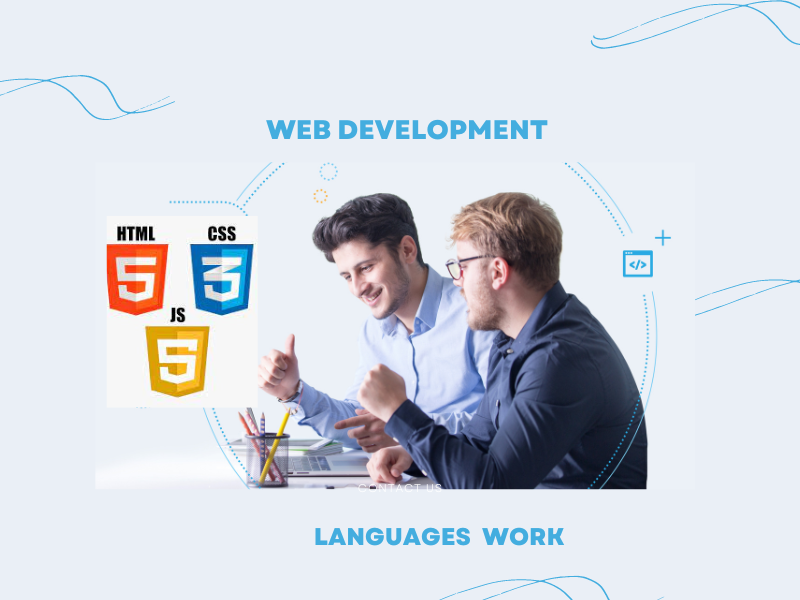7 Web App Development Languages: Top Picks For Developers
Being a newbie in web app development means you will go crazy over choosing which language to learn among so many available options. Each language has its unique style and complexities.
Therefore, if you want to try the waters of every language, it will take years to understand which one is your best bet. That’s why we are here to your rescue.
Want to know about the basics of the most popular web app development languages? Let’s get right into it!
What Is Web Application Development?
Web app development is the process of developing software applications that users can access and utilize using web browsers. In contrast to conventional desktop software, web apps are distributed via the Internet and operate on web servers.
These programs might be as basic as web pages or as sophisticated as interactive platforms with a wide range of features and services.
Developers are using modern frameworks like React, Angular, and Vue.js more and more. These frameworks improve efficiency, simplify maintenance, and provide reusable components, all of which speed up the development process.
Consequently, significant developments have also occurred in the programming languages used in web application development. Statistica’s interesting finding tells us that the web application development industry is anticipated to reach $179.90 billion in 2024.
The rising need for web-based solutions across a range of businesses is what is fueling this expansion.
Some Critical Aspects Of Web Application Development
Web app development is a challenging process. Therefore, it consists of some aspects you need to know before you know the required languages.
Client-Side Development
Client-side development aims to create the online application’s user-interactive components. This includes constructing the user interface with JavaScript to add dynamic behavior and interactivity, CSS to style the material, and HTML to organize it.
Developers may produce aesthetically pleasing, responsive websites that offer a smooth user experience by integrating these technologies.
Server-Side Development
Server-side development is concerned with an online application’s internal workings. This entails creating server-side code that handles operations such as user request processing, database management, and business logic implementation.
For server-side programming, Python, Ruby, Java, PHP, and Node.js are frequently used languages. The key goals of developers are to ensure effective database interactions, safe user authentication, and solid server logic.
Database Management
For web applications to store, organize, and retrieve data, database administration is essential. In order to organize data, developers create and use database schemas. They also build queries to access and modify data and guarantee data security and integrity.
Among the widely used database management systems are MongoDB, PostgreSQL, and MySQL. Effective database management guarantees speedy retrieval, safe storage, and protection against unwanted access.
Libraries And Frameworks
Libraries and frameworks are vital resources that facilitate the development of web applications more quickly. They offer pre-assembled parts, frameworks, and designs that make routine operations like data processing, routing, and authentication easier.
With frameworks like Express.js, Ruby on Rails, and Django, developers can focus on producing original features while adhering to best practices and cutting down on development time. Libraries with more capability and user-friendliness include jQuery, Bootstrap, and Lodash.
Front-End And Back-End Communication
For data interchange and interaction in web applications to be seamless, there must be effective communication between the front end and back end.
APIs, which enable communication between the client-side and server-side components, are usually used to do this.
APIs let users communicate with the server by sending requests and receiving responses, which allows for interactions and changes of dynamic content. For this, technologies like GraphQL and RESTful APIs are frequently used.
How Does Programming Languages Work?
Programming languages contain computer instructions written in structured communication systems. The syntax, or rules for organizing these instructions and keywords, are specific to each programming language.

Programmers use high-level languages like Python or JavaScript to develop programs. The next step is to convert these code instructions into machine code, which is a binary representation of ones and zeros.
These high-level instructions are translated into machine code by the processor so that the computer may carry them out.
In order for programmers and users to properly interact with the system, the information that is produced when the computer processes these orders is frequently translated back into a more intelligible language, usually English.
7 Best Web App Development Languages For Programming
As we already said, different programming languages have their unique strengths, frameworks, and ecosystems. So, you need to decide which one to use based on project requirements, team expertise, scalability needs, and personal preferences. Here are some notable programming languages typically used for web app development:
- Python
Python is a popular and extremely versatile programming language that is easy to learn and understand. It’s a well-liked option for back-end web development since frameworks like Flask and Django offer strong capabilities for creating applications that scale.
The development process is streamlined and best practices are promoted by these frameworks, which facilitate the creation of dependable and effective online applications by developers.
Python’s readability is one of its best qualities. The language is a great option for those new to software development because of its simple, English-like grammar. Also, Python needs less work to learn and write code than other languages.
Scalability is another well-valued feature of Python. Any size project can be handled by it, from tiny startups to massive corporations.
Because of its superiority in data manipulation and analysis, this language is chosen for applications requiring a lot of data processing.
After everything, Python’s ease of use, strong frameworks, and reliable data handling make it a great option for back-end development.
- JavaScript
JavaScript has remained the most popular programming language for more than ten years.
When it comes to developing dynamic and interactive web interfaces, JavaScript is an essential language for web developers. It is a vital component of front-end development, enabling websites to function using HTML and CSS.
Also, well-known frameworks like Vue, Angular, and React.JavaScript gain even more strength via JS, which offers structures and tools to improve functionality and speed up development.
The adaptability of JavaScript is one of the reasons it is so frequently used. It powers not only front-end interfaces but back-end development as well through Node.js.
Therefore, this makes it possible for developers to work on both the client and server sides using the same language.
JavaScript’s proficiency at handling asynchronous processes makes it an excellent choice for developing real-time applications. Moreover, it is very popular because of its large ecosystem of libraries and frameworks.
Furthermore, team productivity is increased by JavaScript package managers like npm (Node Package Manager), which makes it simple to exchange and collaborate on code.
- Ruby
Ruby is a well-known, robust, and sophisticated programming language with a syntax that is easy for developers to understand. Because of the Ruby on Rails framework, web application development has made it especially well-liked.
Ruby on Rails, commonly referred to as Rails, has transformed the industry through its “convention over configuration” approach.
With this method, there is less need for complex configuration because developers can work more quickly and efficiently by sticking to predetermined rules.
Ruby on Rails has several advantages, one of which is its speedy development. Also, Ruby is a great option for small businesses and startups who want to develop web apps fast and effectively.
In addition, Ruby has a vibrant and engaged community that supports its ecosystem. Many gems, or libraries, have been developed by this community to make routine activities, including database management and authentication, easier to do.
Ruby is very highly respected in the industry even if it isn’t as widely used as some other languages.
Ruby is used by GitHub, Airbnb, Hulu, and other companies for their online apps, proving its dependability and efficiency. It is an excellent option for those who value productivity and efficiency.
- Java
For many years, Java has been a cornerstone in the field of enterprise-level web applications due to its robustness and versatility.
Java is the preferred language for creating large-scale applications that can manage complicated operations and enormous traffic volumes.
Java is very strong in terms of scalability. Large volumes of data and user interactions may be managed and processed rapidly by it, which makes it perfect for enterprise applications that need consistent performance.
Moreover, Java’s robust security model further makes it a popular option for applications handling sensitive data and transactions.
Legacy system maintenance and modernization are other common uses for Java. Java is used by several well-known companies, such as Google, Instagram, Netflix, and Amazon, to maintain the functionality of existing systems and add new features.
Furthermore, Java can run on any device or operating system that supports the Java Virtual Machine (JVM), all because of the JVM’s ability to enable platform independence. Furthermore, Java’s adaptability is further enhanced by the fact that other well-known programming languages like Kotlin, Scala, and Groovy also use the JVM as their runtime.
Even though some have predicted that Java may become obsolete, enterprise applications still heavily favor it. It is a dependable and trustworthy language because of its sophisticated security features, simplicity of code reuse, and broad library support.
- PHP
PHP is a well-liked programming language that is frequently used for online development, especially for making dynamic content. It runs numerous well-known websites, such as Facebook, Tumblr, and Wikipedia.
PHP’s user-friendliness is one of its main advantages. It’s a great option for novices because of its easy learning curve. Also, developers can easily pick up the skills necessary to produce beautiful, easily maintainable, and debuggable web apps.
Because of PHP’s simple syntax, inexperienced developers can quickly begin creating working websites.
PHP is frequently used with frameworks such as Symfony and Laravel. These frameworks improve PHP’s functionality by offering organized settings for creating dependable and expandable web applications.
The extensive and vibrant PHP community has contributed a wide range of libraries, frameworks, and automation tools. The assistance of the community facilitates problem-solving, knowledge sharing, and skill development for developers.
PHP is still in great demand even though newer languages are competing with it. For many developers and enterprises, it is a dependable option because of its speedy and effective construction of both dynamic and static websites.
- C# / ASP.NET
Microsoft created the flexible programming language C#, which is extensively used for web development using the ASP.NET platform. It has been around for more than 20 years and is especially well-liked for creating Windows services and apps.
C# was created as a quicker and safer alternative to C and C++. It is an object-oriented language with features meant to boost the efficiency of applications and the productivity of developers.
Type safety is one such feature that aids with mistake prevention both during compilation and runtime. Furthermore, C# offers an automatic garbage collection mechanism that ensures effective memory management by erasing and removing superfluous data.
Besides, its cross-language compatibility is one of its main advantages. The extensive class libraries that C# offers greatly expedite the development process and facilitate the implementation of numerous functions. Applications written in C# span widely, from server programs to mobile games.
Both novice and seasoned developers may learn C# due to a wealth of resources and documentation.
- Go (Golang)
Go, sometimes referred to as Golang, is a relatively new programming language that has become very popular very quickly because of its effectiveness and speed. It was developed by Google engineers to address complex problems, and it’s especially useful for developing scalable back-end systems and APIs.
Surprisingly, it is one of the programming languages with the greatest growth right now because of its design. For developers wishing to launch their careers or advance their technical expertise, this expansion presents a wealth of chances.
Speed is one of the main characteristics of Go. Because it is a statically typed, compiled language, code is translated straight into machine code, leading to quick execution speeds.
Therefore, Go is an appealing choice for developers who require effective and performant apps because of its speed and simplicity.
The syntax and organization of Go are intended to be simple and easy to understand. Although some of the more sophisticated capabilities offered in other languages, such as C++, are absent, this minimalism is deliberate.
Moreover, Go’s interoperability is yet another advantage. It is a flexible option for many projects because of its broad support and ease of integration with various systems and languages.
It is a great option for back-end development because of its speed, simplicity, and scalability—especially for developing scalable systems and APIs.
Looking For Something Exceptional?
Programming language and web app development languages are not the same. Therefore, one cannot be the jack of all trades. If you are seeking complete expertise in all these areas, you need to hire an exclusive web app development team.
So, do you need expertise in a specific web app development language to meet your unique project requirement? Look no further than BoomDevs!
BoomDevs has incredibly expert teams who are skilled in different programming languages, so you can find exactly what you are looking for. They offer the best help, so you won’t have to go through all the hassles of learning another language.
Frequently Asked Questions (FAQs)
Who creates web apps?
Web developers create web apps. They use languages like HTML5, CSS, and JavaScript for client-side programming, which constructs the front end, to create web apps. Writing scripts for the online application—typically in Python, Ruby, or PHP—is known as server-side programming.
Can web apps make money?
Ads are a viable source of income for web apps. Advertisers will bid for ad space on a well-liked online app that draws in leads, creating a source of revenue.
Is Web App Development in demand?
Yes, there is a great demand for web developers. Skilled web developers are needed across a variety of businesses, with job growth predicted until 2032 and new technologies like augmented reality and natural language processing.
What is the future of web application?
Progressive Web Apps are going to be big in the future of web development. As mobile devices get better, PWAs—which provide quick loading times, a smooth user experience, and capabilities akin to native apps—become the go-to way to access web applications.
Bottom Line
So, according to our analysis of the web app development languages, you can already see some of the most popular languages that are in demand. But you need to remember that there is no universal solution for every programmer.
Therefore, you need to do your own research before you stick to one language. Consider your needs, applications, and market, and then choose the language that offers you the best benefits.






